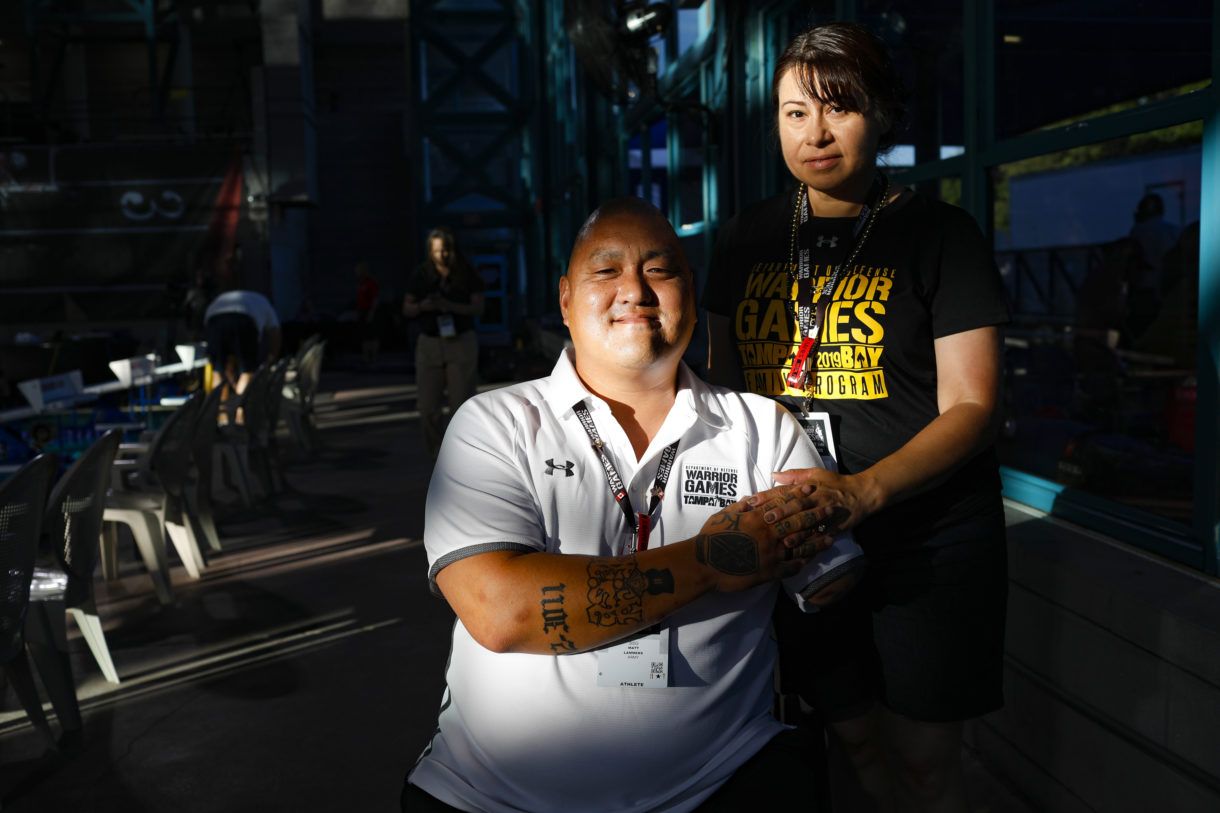There are times when retired Staff Sgt. Matt Lammers doesn’t look like he needs anyone’s help — like when he was competing, and winning, races at the Department of Defense Warrior Games in Tampa, Fla., this summer.
“We don’t like to say the word ‘can’t’ in our family,” says Matt, who lost both his legs above the knee and his left arm to an explosion during his second deployment to Iraq in 2007.
Then he goes on to list all the things he just can’t do without help from his wife, Alicia.
“She helps me shower. … She helps me transfer in my wheelchair, drives me to my appointments,” says Matt, while on a break between events at the games. “I’d honestly say, not to be smart, but the question is, What she doesn’t do?”
Matt won medals at the games in Tampa for sitting volleyball, swimming and indoor rowing. At the end of the games, the U.S. Army gave him the “heart of the team” award. But he and his wife almost didn’t attend, because they were short on cash to make the trip after Alicia was cut from the Department of Veterans Affairs’ caregiver program last December because Matt had not “consistently engaged in treatment,” according to a letter from the VA. Alicia had been Matt’s official caregiver for most of eight years.
“It felt like a stab in the back, like what I do is not worth it in their opinion, like I’m not part of their team like I thought I was,” she says.
Uneven standards and implementation
The VA program provides support and a stipend to caregivers for post-Sept. 11 veterans, usually a wife or parent. It got going in 2011 and was instantly popular among vets as recognition of the billions of dollars worth of labor performed by family members for disabled veterans through the decades. The program was prepared for only a small number of applications and was overwhelmed by the tens of thousands of veterans who applied.
Almost from the start, that meant problems with uneven standards and implementation around the United States. NPR has reported on hundreds of caregivers being arbitrarily cut from the program; so has the Government Accountability Office and the VA’s inspector general. Twice in two years, the VA has frozen the process of discharging people from the caregiver program, most recently last Dec. 20.
“It is essential that we get this right,” VA Secretary Robert Wilkie said at the time. “This affects one of our most vulnerable veteran populations, and we need to make sure we have consistency on how we process and evaluate benefit applications across VA.”
Unfortunately for Matt and Alicia, that freeze came six days after a letter from the VA in Fayetteville, N.C., on Dec. 14.
“I got a letter saying that I was out of the program because the veteran hasn’t shown any progress since 2011,” said Alicia. “I asked them, ‘What do you mean by progress?’ ”
That question is at the heart of a fundamental problem with the way the VA caregiver program was created. Originally it was intended as a temporary intervention.
“Well, amputations and paralysis are permanent conditions,” says Sherman Gillums, a former Marine who is paraplegic. “It’s not about recovery. It’s about sustaining your life. Even if they’re cut off from the program, they’re still needing that care.”
Gillums is with the group AMVETS, but he’s also on the VA’s caregiver advisory committee. He’s concerned that the VA needs to change the “recovery based” model now, before a planned expansion to older vets that could double or even triple the number of caregivers enrolled. And he says the program should be permanent for catastrophically injured vets such as Matt.
“No significant improvement”
Not that Matt’s case is without its complications. Besides his missing limbs, Matt has PTSD and brain injuries.
“Not just the physical but the mental disabilities too — that is very challenging. It’s every day. It’s a constant change,” says Alicia.
She says that’s why the VA’s assessment that Matt hasn’t improved hurt. He’s doing better now than he has in years. He has struggled in the past with drug abuse and even ended up homeless. He has been abusive to his wife and others, sometimes physically.
“He has progress daily,” says Alicia. “But sometimes he has bad days or weeks. … Life is like that.”
The Fayetteville VA told the couple in the Dec. 14 letter that “there has been no significant improvement” since Matt entered the program in 2011 and that he “has not consistently engaged in treatment.”
In response to a query from NPR, the Fayetteville VA said that for Matt, the program “was no longer in his best interest. He refused to follow his care plan, seriously endangering his health and that of those around him.”
The VA was alluding to his abusive behavior in the past. But Alicia says she has stuck with him through that.
“I’m not leaving. I’m still with him, and I’m still gonna do what I do,” she says. “I still have to help him. I still have to drive him. I still have to take him to appointments. I’m still gonna do this if you pay me or not.”
The VA also reached out to the couple and encouraged them to follow the VA’s care plan and then reapply for the caregiver program in six months. They say they will, but Matt says he’s still stung by the assessment that he hasn’t made progress since 2011.
“All three of my limbs are still amputated, as they were June, 10 June 2007. Those have not grown back,” says Matt. “I wouldn’t change anything for the world. I’m not complaining. I don’t get hung up on injuries, but what they exactly expect from us triple amputees, single amputees, paras … I don’t, I can’t really comprehend that.”
9(MDEwNzczMDA2MDEzNTg3ODA1MTAzZjYxNg004))
